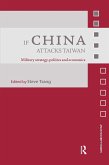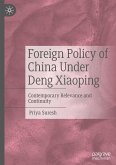- Gebundenes Buch
- Merkliste
- Auf die Merkliste
- Bewerten Bewerten
- Teilen
- Produkt teilen
- Produkterinnerung
- Produkterinnerung
Presents an understanding of Chinese security policy. This book covers such fundamental areas as the role of international structure in state behavior, the use of force in international politics (including deterrence, coercive diplomacy, and war), and the sources of great-power conflict and cooperation and balance of power politics.
This volume provides a coherent and comprehensive overview of Chinese security policy, comprising essays written by one of America's leading scholars.
Andere Kunden interessierten sich auch für
![Chinese Security Policy Chinese Security Policy]() Robert RossChinese Security Policy68,99 €
Robert RossChinese Security Policy68,99 €![If China Attacks Taiwan If China Attacks Taiwan]() Steve Tsang (ed.)If China Attacks Taiwan181,99 €
Steve Tsang (ed.)If China Attacks Taiwan181,99 €![Genocide and Resistance in Southeast Asia Genocide and Resistance in Southeast Asia]() Ben KiernanGenocide and Resistance in Southeast Asia172,99 €
Ben KiernanGenocide and Resistance in Southeast Asia172,99 €![American Foreign Policy and The Politics of Fear American Foreign Policy and The Politics of Fear]() American Foreign Policy and The Politics of Fear58,99 €
American Foreign Policy and The Politics of Fear58,99 €![Dictionary of the Modern Politics of Southeast Asia Dictionary of the Modern Politics of Southeast Asia]() Joseph Chinyong LiowDictionary of the Modern Politics of Southeast Asia181,99 €
Joseph Chinyong LiowDictionary of the Modern Politics of Southeast Asia181,99 €![Foreign Policy of China Under Deng Xiaoping Foreign Policy of China Under Deng Xiaoping]() Priya SureshForeign Policy of China Under Deng Xiaoping104,99 €
Priya SureshForeign Policy of China Under Deng Xiaoping104,99 €![Order and Security in Southeast Asia Order and Security in Southeast Asia]() Ralf Emmers / Joseph Liow (eds.)Order and Security in Southeast Asia179,99 €
Ralf Emmers / Joseph Liow (eds.)Order and Security in Southeast Asia179,99 €-
-
-
Presents an understanding of Chinese security policy. This book covers such fundamental areas as the role of international structure in state behavior, the use of force in international politics (including deterrence, coercive diplomacy, and war), and the sources of great-power conflict and cooperation and balance of power politics.
This volume provides a coherent and comprehensive overview of Chinese security policy, comprising essays written by one of America's leading scholars.
This volume provides a coherent and comprehensive overview of Chinese security policy, comprising essays written by one of America's leading scholars.
Produktdetails
- Produktdetails
- Verlag: Taylor & Francis Ltd (Sales)
- Seitenzahl: 344
- Erscheinungstermin: 1. Mai 2009
- Englisch
- Abmessung: 234mm x 156mm x 21mm
- Gewicht: 658g
- ISBN-13: 9780415777858
- ISBN-10: 0415777852
- Artikelnr.: 26608068
- Herstellerkennzeichnung
- Libri GmbH
- Europaallee 1
- 36244 Bad Hersfeld
- gpsr@libri.de
- Verlag: Taylor & Francis Ltd (Sales)
- Seitenzahl: 344
- Erscheinungstermin: 1. Mai 2009
- Englisch
- Abmessung: 234mm x 156mm x 21mm
- Gewicht: 658g
- ISBN-13: 9780415777858
- ISBN-10: 0415777852
- Artikelnr.: 26608068
- Herstellerkennzeichnung
- Libri GmbH
- Europaallee 1
- 36244 Bad Hersfeld
- gpsr@libri.de
Robert S. Ross is Professor of Political Science at Boston College, Associate, John King Fairbank Center for East Asian Research, Harvard University, and Senior Advisor, Security Studies Program, Massachusetts Institute of Technology.
Introduction: Structure, Power, and Politics in Chinese Security Policy
Part 1: Great Power Politics and East Asian Security 1. China Learns to
Compromise: Change in U.S.-China Relations, 1982-1984 (1991) 2. The
Geography of the Peace: Great Power Stability in Twenty-First Century East
Asia (1999) 3. The U.S.-China Peace: Great Power Politics, Spheres of
Influence, and the Peace of East Asia (2003) 4. Balance of Power Politics
and the Rise of China: Accommodation and Balancing in East Asia (2006)
Part 2: Deterrence and Coercive Diplomacy in Chinese Security Policy 5.
China and the Cambodian Peace Process: The Value of Coercive Diplomacy
(1991) 6. The 1995-96 Taiwan Strait Confrontation: Coercion, Credibility,
and Use of Force (2000) 7. Navigating the Taiwan Strait: Deterrence,
Escalation Dominance, and U.S.-China Relations (2002) Part 3: Domestic
Politics and Foreign Policy 8. International Bargaining and Domestic
Politics: Conflict in U.S.-China Relations Since 1972 (1986) 9. From Lin
Biao to Deng Xiaoping: Elite Instability and China's U.S. Policy (1989) 10.
The Diplomacy of Tiananmen: Two-Level Bargaining and Great Power
Cooperation (2001)
Part 1: Great Power Politics and East Asian Security 1. China Learns to
Compromise: Change in U.S.-China Relations, 1982-1984 (1991) 2. The
Geography of the Peace: Great Power Stability in Twenty-First Century East
Asia (1999) 3. The U.S.-China Peace: Great Power Politics, Spheres of
Influence, and the Peace of East Asia (2003) 4. Balance of Power Politics
and the Rise of China: Accommodation and Balancing in East Asia (2006)
Part 2: Deterrence and Coercive Diplomacy in Chinese Security Policy 5.
China and the Cambodian Peace Process: The Value of Coercive Diplomacy
(1991) 6. The 1995-96 Taiwan Strait Confrontation: Coercion, Credibility,
and Use of Force (2000) 7. Navigating the Taiwan Strait: Deterrence,
Escalation Dominance, and U.S.-China Relations (2002) Part 3: Domestic
Politics and Foreign Policy 8. International Bargaining and Domestic
Politics: Conflict in U.S.-China Relations Since 1972 (1986) 9. From Lin
Biao to Deng Xiaoping: Elite Instability and China's U.S. Policy (1989) 10.
The Diplomacy of Tiananmen: Two-Level Bargaining and Great Power
Cooperation (2001)
Introduction: Structure, Power, and Politics in Chinese Security Policy Part 1: Great Power Politics and East Asian Security 1. China Learns to Compromise: Change in U.S.-China Relations, 1982-1984 (1991) 2. The Geography of the Peace: Great Power Stability in Twenty-First Century East Asia (1999) 3. The U.S.-China Peace: Great Power Politics, Spheres of Influence, and the Peace of East Asia (2003) 4. Balance of Power Politics and the Rise of China: Accommodation and Balancing in East Asia (2006) Part 2: Deterrence and Coercive Diplomacy in Chinese Security Policy 5. China and the Cambodian Peace Process: The Value of Coercive Diplomacy (1991) 6. The 1995-96 Taiwan Strait Confrontation: Coercion, Credibility, and Use of Force (2000) 7. Navigating the Taiwan Strait: Deterrence, Escalation Dominance, and U.S.-China Relations (2002) Part 3: Domestic Politics and Foreign Policy 8. International Bargaining and Domestic Politics: Conflict in U.S.-China Relations Since 1972 (1986) 9. From Lin Biao to Deng Xiaoping: Elite Instability and China's U.S. Policy (1989) 10. The Diplomacy of Tiananmen: Two-Level Bargaining and Great Power Cooperation (2001)
Introduction: Structure, Power, and Politics in Chinese Security Policy
Part 1: Great Power Politics and East Asian Security 1. China Learns to
Compromise: Change in U.S.-China Relations, 1982-1984 (1991) 2. The
Geography of the Peace: Great Power Stability in Twenty-First Century East
Asia (1999) 3. The U.S.-China Peace: Great Power Politics, Spheres of
Influence, and the Peace of East Asia (2003) 4. Balance of Power Politics
and the Rise of China: Accommodation and Balancing in East Asia (2006)
Part 2: Deterrence and Coercive Diplomacy in Chinese Security Policy 5.
China and the Cambodian Peace Process: The Value of Coercive Diplomacy
(1991) 6. The 1995-96 Taiwan Strait Confrontation: Coercion, Credibility,
and Use of Force (2000) 7. Navigating the Taiwan Strait: Deterrence,
Escalation Dominance, and U.S.-China Relations (2002) Part 3: Domestic
Politics and Foreign Policy 8. International Bargaining and Domestic
Politics: Conflict in U.S.-China Relations Since 1972 (1986) 9. From Lin
Biao to Deng Xiaoping: Elite Instability and China's U.S. Policy (1989) 10.
The Diplomacy of Tiananmen: Two-Level Bargaining and Great Power
Cooperation (2001)
Part 1: Great Power Politics and East Asian Security 1. China Learns to
Compromise: Change in U.S.-China Relations, 1982-1984 (1991) 2. The
Geography of the Peace: Great Power Stability in Twenty-First Century East
Asia (1999) 3. The U.S.-China Peace: Great Power Politics, Spheres of
Influence, and the Peace of East Asia (2003) 4. Balance of Power Politics
and the Rise of China: Accommodation and Balancing in East Asia (2006)
Part 2: Deterrence and Coercive Diplomacy in Chinese Security Policy 5.
China and the Cambodian Peace Process: The Value of Coercive Diplomacy
(1991) 6. The 1995-96 Taiwan Strait Confrontation: Coercion, Credibility,
and Use of Force (2000) 7. Navigating the Taiwan Strait: Deterrence,
Escalation Dominance, and U.S.-China Relations (2002) Part 3: Domestic
Politics and Foreign Policy 8. International Bargaining and Domestic
Politics: Conflict in U.S.-China Relations Since 1972 (1986) 9. From Lin
Biao to Deng Xiaoping: Elite Instability and China's U.S. Policy (1989) 10.
The Diplomacy of Tiananmen: Two-Level Bargaining and Great Power
Cooperation (2001)
Introduction: Structure, Power, and Politics in Chinese Security Policy Part 1: Great Power Politics and East Asian Security 1. China Learns to Compromise: Change in U.S.-China Relations, 1982-1984 (1991) 2. The Geography of the Peace: Great Power Stability in Twenty-First Century East Asia (1999) 3. The U.S.-China Peace: Great Power Politics, Spheres of Influence, and the Peace of East Asia (2003) 4. Balance of Power Politics and the Rise of China: Accommodation and Balancing in East Asia (2006) Part 2: Deterrence and Coercive Diplomacy in Chinese Security Policy 5. China and the Cambodian Peace Process: The Value of Coercive Diplomacy (1991) 6. The 1995-96 Taiwan Strait Confrontation: Coercion, Credibility, and Use of Force (2000) 7. Navigating the Taiwan Strait: Deterrence, Escalation Dominance, and U.S.-China Relations (2002) Part 3: Domestic Politics and Foreign Policy 8. International Bargaining and Domestic Politics: Conflict in U.S.-China Relations Since 1972 (1986) 9. From Lin Biao to Deng Xiaoping: Elite Instability and China's U.S. Policy (1989) 10. The Diplomacy of Tiananmen: Two-Level Bargaining and Great Power Cooperation (2001)









